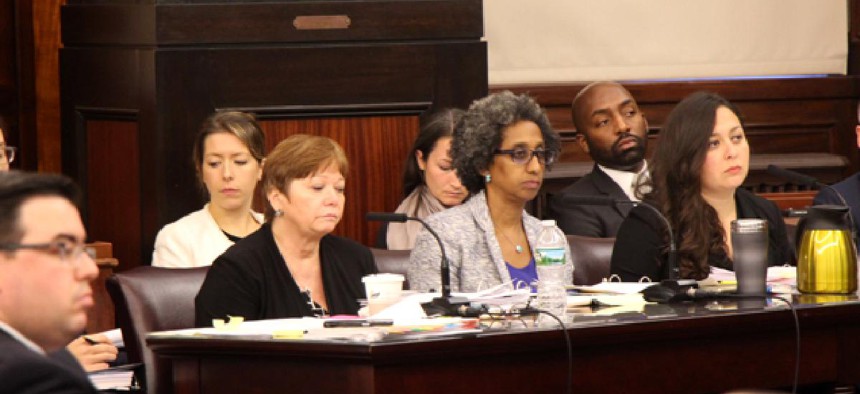ACS promises reforms at emotional hearing over Zymere Perkins

Photo: Dan Rosenblum
Sharing few details, Administration for Children’s Services Commissioner Gladys Carrion tearfully apologized Oct. 31 for oversights that contributed to the death of six-year-old Zymere Perkins, whose case was under the supervision of her agency.
Speaking at a hearing of the City Council’s General Welfare Committee, Carrion teared up as she reached the end of her prepared remarks. “I have committed my entire career to helping children at risk,” she said. “Losing a child is unbearable and it’s my responsibility, and one that I take that seriously.”
ACS reportedly closed the case prematurely, though the Harlem boy had suffered numerous episodes of child abuse and neglect. His mother and her boyfriend were both charged in crimes related to his Sept. 26 death.
Elected officials, who grilled the de Blasio administration officials for nearly five hours, were frustrated about the lack of details that have emerged from Perkins’s case. The de Blasio administration has said it can’t share case-specific information and hasn’t yet interviewed key staffers, citing a written request by the Manhattan District Attorney’s office, which is conducting its own investigation.
Carrion said that during her tenure it was “the first time that I’m aware of that the DA has made a request that we pause our investigation,” for such a length of time.
Council Speaker Melissa Mark-Viverito asked why the Perkins case was different from that of the 2014 death of Myls Dobson in which the Mayor’s Office released preliminary findings within two weeks. “We’re not sure why this case is different, which is what we’re trying to get clarification on,” she told reporters. “It’s preventing the agency from interacting with the staff and making inquiries. It’s affecting, obviously, our ability to do proper oversight in getting questions on how do we make a improvements.”
Still, she defended Carrion: “She has a trajectory of commitment to the children of this city, I do not doubt that for a minute.”
Nevertheless, ACS has reviewed some records and suspended four deputy commissioners and directors, and has placed five rank-and-file staffers on modified duty. Public Advocate Letitia James said more should be done. “I think it’s just insufficient that the only action taken thus far is to only discipline rank-and-file employees and managers, I think it requires additional action on the part of this administration,” she said.
The ACS Commissioner said the agency would introduce more training for workers on how to approach suspected physical abuse; establish dedicated child protective liaisons to work with District Attorneys; hold a termination conference when closing high-risk cases; and appoint a 12-person audit team to oversee staffers; and change staffing alignments at five Child Advocacy Centers.
“It’s an easy jump to a conclusion after a tragic case like Zymere’s that more children should be removed from their homes, but that is not always what is in the best interest of the child or the family,” said Deputy Mayor of Health and Human Services Herminia Palacio.
Child protection is spread over several agencies, and representatives from the Department of Education, Mayor’s Office to Combat Domestic Violence and Department of Social Services joined Carrion and Palacio. ACS will work with the Department of Homeless Services as well as shelter providers to share more information about families in the shelter system; train parent coordinators at schools to assess and watch at-risk children; and charge a “senior advisor for investigations” with overseeing a team handling serious cases in which ACS and NYPD collaborate.
There have been other reforms at ACS, most notably after the 2006 death of Nixzmary Brown, and, most recently, following recent City Comptroller and Department of Investigation probes.
“As administrations change and there are budget cuts that are implemented, eyes are taken off those reforms,” Carrion said, pointing to 1,500 job losses and more than $200 million budget cuts after the recession. “But for the most part, as far as I can see, most of those reforms have been sustained.”
The typical caseworkers handles 9.2 children, below the national standard of 12, and less than the average caseload of 16.5 a decade ago, Palacio said. But ACS caseworkers have long complained of low pay, heavy caseloads and the potential for threats during emotionally fraught home visits. Dozens of them who sat in the City Hall council chambers grumbled as city officials touted low caseloads.
But James questioned the definitions of cases that are included in the data, the count of how many are on leave among the roughly 1,600 caseworkers, as well the the drivers behind the attrition rate in which one of every four new employees leave within the first year.
Carrion said they left for good reason: “Those are not the people cut out to do this kind of work,” she said.
James also questioned the structure of city contracts with nonprofit service providers.
“We have outsourced, basically, foster care, to these contract agencies which, unfortunately, there are duplicative management structures, confusing decision-making processes and procurement rules, which again has resulted in children slipping through the cracks and their cases languishing for years.”
